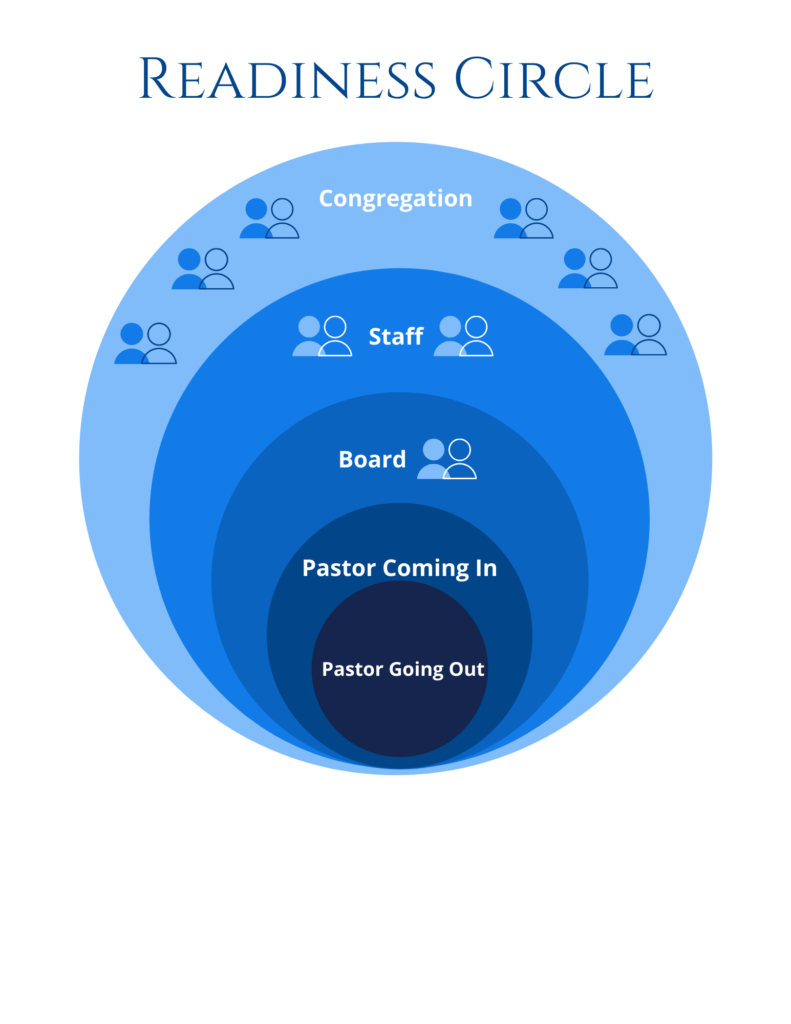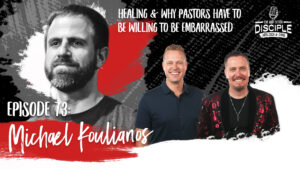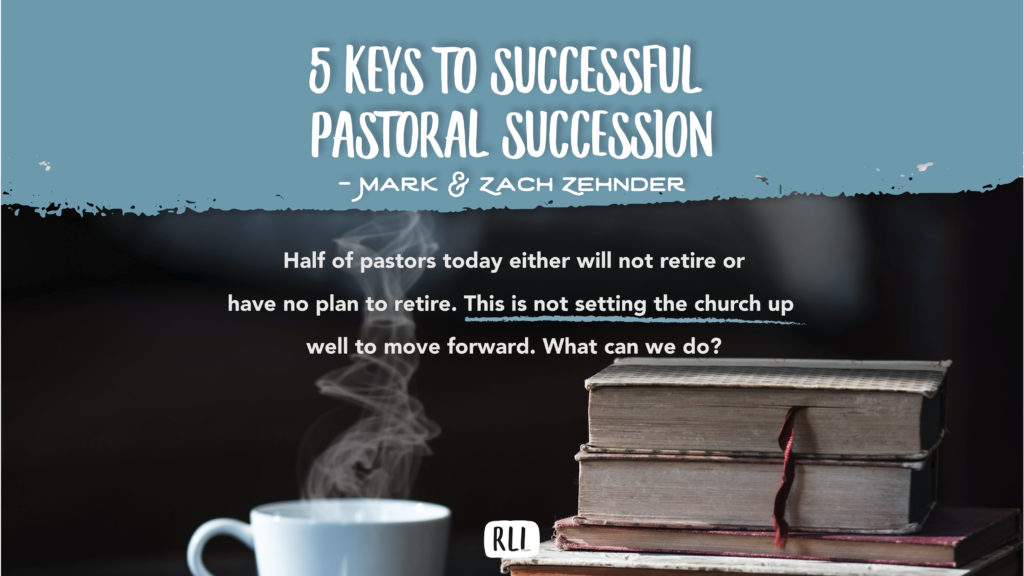For the month of March we are looking at the future of pastoral ministry. We’ve looked at topics like: There’s a Pastoral Crisis Right Now. Don’t Believe These 5 Lies!, 5 Predictions if Pastors Really Did Quit and 3 Reasons Pastors Don’t Develop Other Pastors. Many pastors are tired and exhausted, and record-numbers are thinking about quitting. If this is the case, how can we set up the church well in the future?
When I think of someone who is excelling in moving the church forward, I think of none other than my dad, Rev. Dr. Mark Zehnder. Today, he gives us the 5 keys to healthy pastoral succession.
Without further ado, here are his words:
Some people love history. They love to study and read it. They might even enjoy going to museums and looking at how things were thousands of years ago.
Me? Not so much. While I don’t dislike history, I would much rather be a part of making history. I guess that’s just another way of saying that the way God wired me up, I am someone who looks forward much more than someone who looks back.
In my 40 + years of pastoral ministry, I spent a significant amount of time trying to help people look forward. I wanted to inspire them to a brighter future, a grander vision. Knowing that, I was in for a bit of a surprise when I approached the date of my retirement a couple of years ago. I would have thought this season I was entering would be different, that it would be more about wrapping things up than thinking about the future. But, man, was I wrong. I realized that passing the leadership baton to my successor just may have been the most important thing I’ve ever done when it comes to the future!
Think about it. If we don’t do all we can to get this right, the church suffers, and the future is not as bright as it could be or should be. And as Zach said in the previous blog, the statistics for pastoral leadership transition are not very good. As much as 80% of these transitions do not go well.
Here’s what I’ve seen:
- Some churches just Stop. They cease to exist. This is the worst case scenario.
- Other churches Split. Because they didn’t plan, they couldn’t stay united. Power grabs happen and the church divides.
- Other churches Stall. This isn’t as bad as the first two cases but is still not good. They lose momentum and the Gospel proclamation gets shelved and the mission of Jesus stalls.
So, this begs the question: How can we partner with God and each other to change these numbers? How can we avoid seeing our churches Stop, Split, or Stall and instead experience SUCCESS!
Having researched this topic extensively, conducted many interviews, read the good books that are out there on this topic, listened to podcasts, and experienced a pastoral transition personally, here are 5 keys to a healthy pastoral succession.
1. Perspective…Get the real picture.
From the get-go, even before you begin your planning, it is helpful to have a mindset or perspective that will prepare you for what’s ahead. So, what’s ahead? What do you need to see or know even before you start?
- There is no such thing as a one-size-fits-all transition plan. Don’t think you can follow what some other pastor or other church did that seemed to work for them. It won’t work for you. Every church, outgoing pastor and incoming pastor, staff, board, and congregation are unique.
- Successful leadership transition is more of an art than a science. It’s more of a process than an event.
- It will be unpredictable…it is messy, complex, and complicated.
- It likely will not take the time you think it will. In my view, 10% will take the time you have allocated. Another 10% will even go more quickly than you anticipated. But 80% take more time than you think. So, it’s probably not too early to start planning.
- The process is almost always healthier when you bring in a third party. William Vanderbloeman and Warren Bird, authors of the best book on this topic, Next: Pastoral Succession that Works, speak of the helpfulness of having a coach or a consultant.
- Pastoral transition is not over when the new guy takes the helm. Again, Vanderbloemen and Bird say that the complete process typically takes 2-3 years.
So having this perspective is helpful even before you begin. Now, what’s the first thing you’ll want to do to actually get the ball rolling?
2. Pray…Get on your knees.
In light of the statistics above, and in the complexity and unpredictability of this process, it can be easy to get discouraged. But you have something huge in your favor as you begin—it is this unique gift of prayer. Actually, it is not a huge something that you have in your corner. It’s a huge Someone! God is certainly not unaware of your situation. He will not be surprised that you are looking for your next pastor. If Jesus said, “I WILL build my church, and the gates of Hades will not come against it,” He certainly is more than capable of blessing you in your succession plan. And He loves it when we recognize and acknowledge our limitations and entrust this to Him in prayer.
Here’s a little snippet of our story at our church. In 2018 we began the process of looking for my successor. Admittedly we felt that we were “making things up” when it came to our plan, and after nearly a year, we were nowhere. So we began 2019 with 21 Days of prayer. I remember that the Holy Spirit revealed to us a shift in our prayer…we HAD BEEN praying that God would show us the pastor. So we started 2019 by adding to that prayer, not just show us, Lord, but show the pastor. So we prayed, “God stir up the heart of the pastor that you want to bring to King of Kings.” A week later, I was attending a conference in Palm Springs (which is a pretty nice place to be in January when you live in Omaha!), and I found myself talking with Greg Griffith, a young pastor that I only sort of knew.
When I asked Greg how things were going at his church, he said something like, “you know, I could see being where I am for quite a while, but lately, it feels like God is “stirring me up.” Yay God!
At that moment, I felt the Lord saying to me, “you have found your pastor.” Sure enough, after several months of conversations that followed that meeting in Palm Springs, God brought Greg to be our next Lead Pastor at King of Kings.
The best thing you can do before you start your process—your first move, your second move, your every move along this process is to pray, pray, pray!!
Now for the next key to healthy leadership succession:
3. Plan…Get ready.
I know you’ve undoubtedly heard it, but it is so true…if you fail to plan, you may as well plan to fail. Here’s part of why pastoral leadership transition does not go well (it’s not the only reason, but it certainly contributes to it). According to Vanderbloemen and Bird:
- 25% of denominational pastors will retire but have no retirement plan.
- 25% of denominational pastors do not ever plan to retire.
So right there, you have half of churches and congregations that will have to deal with this, and there is no plan. Most pastors and churches simply are NOT READY! So, here’s what I’ve observed. This observation, along with all kinds of collaborating information, has brought me to this conclusion and a diagram…I call it the Readiness Circle.

Here’s my conviction and contention…that more than anyone, the outgoing pastor must be ready (First Circle).
- Am I emotionally ready?
- Am I professionally ready?
- Am I relationally ready?
- Am I spiritually ready?
- Am I physically ready?
- Am I financially ready?
But there are times when the pastor going out is indeed ready, but nobody else in the church or organization is ready. What’s honestly worst is when the board or staff is ready for the pastor to leave, but the pastor isn’t!
So, here’s my firmly held belief. The outgoing pastor’s responsibility is to get ready and help everyone else get ready. This starts with the new pastor coming in (Second circle). The “no one size fits all” comment earlier comes in here. Sometimes the outgoing pastor has someone on staff that they believe is the right successor. Sometimes, they might think this, but the staff or board might think differently. Or maybe the board and staff feel they have the right successor, but the outgoing pastor doesn’t think so. Or perhaps, no one on the staff is a possible candidate.
All this said I think in the best and most healthy of situations, the pastor going out can get the pastor coming in the readiest. What worked for us at King of Kings was the 5 months that Greg and I spent basically joined at the hip. During this time, I poured into him every possible bit of information I could…the history, culture, personality, valleys and mountaintops, my personal hopes, fears, etc. I’m sure that Greg would agree that this 5-month period was beneficial and necessary. There is some debate about how long the transition should be…for us, this was just right.
As I was becoming secure in my own readiness and then seeing that Greg was prepared and ready, I knew the next step was getting the Board ready (Third circle). In our case, this was happening simultaneously with getting the staff ready (Fourth circle). Critical in both of these groups of people were open, frank, and honest conversations.
We wanted to be honest and open about these issues…
- Grief: I have heard from many pastors and churches that this grief area is often overlooked. Especially in long pastorates, there can be a lot of sadness connected with seeing the lead pastor moving on. Don’t disregard or ignore this. Make room for it.
- Allegiance: Especially with the staff, I consistently reminded them that I needed and wanted them to get 100% behind Greg and that doing so was not removing their allegiance to me. I reiterated how the best thing they could do for me was not to hold on to me but put all their support behind Greg.
- Funeral/Wedding: One of the podcasts that Greg and I listened to talked about the metaphor of the funeral and marriage…that this new relationship could have feelings of both. Like a funeral, I honestly did feel some loss along the way, and there was some sadness associated with stepping aside and no longer leading. At the same time, like a wedding, I felt that this new relationship was the best for King of Kings and that our future looked marvelous and was very exciting.
- Finances/Budget/Salary: This topic is probably worthy of a separate blog. There are complexities galore with this one, but bottom line, this is NOT a time for the church to be stingy or anxious about finances. I can say this without a doubt…churches that don’t get this pastoral leadership transition right will end up “paying for it” in the end.
In chronological order, the final and fifth circle is last, but so extremely important…getting the congregation ready! One of the things I had as a personal goal was quite simple: make my friends Greg’s friends. If I could get my best and personal friends in the church, along with as many other church members, to become friends with Greg as they had been with me, everybody would win. To do this, we held:
- Cocktail, hors d’oeuvres parties in members’ homes where Greg and I had little joint vision talks so that people could see that we were on the same page.
- Pizza lunches after church where people met Greg and his family.
- Public, corporate worship services where people saw Greg and me together nearly every week during those five months. At the very beginning of the services, we actually incorporated little comedy sketches and other fun things so that people could see Greg and me laughing and having fun together.
Baton pass Sunday…this was the day that I officially passed the baton of leadership to Greg. I preached on Moses and Joshua and what God told each of them about their succession plan. If you’d like, you can watch the baton-passing message here. I consider this one of THE most important days we had in this transition.
As more open and honest discussions ensued, we agreed that after the “Baton Pass Sunday,” it would be mutually beneficial to all parties if I would leave on a 9-month sabbatical. The sabbatical was to give me a much-needed rest from more than 27 years of ministry and allow Greg to instill his new vision at the church without me being there. In addition, it was an obvious indicator to the church that we were entering a new season.
Another huge part of our success had to do with this 4th key…
4.Communicate…Get the word out.
Using the “Readiness Circle” again…
First circle…my constant communication with God and my wife…how is this going, how am I feeling, where are my concerns?
The second circle…it was absolutely essential that Greg and I kept the lines of our communication open. Even after two years, we still meet twice a month to ensure that we are keeping in step with each other.
Third Circle…the Board…I think this is another “no one size fits all” area…and honestly, I am not sure I have an excellent answer for this. Still, I know of situations where the pastor going out had the attitude that “I will not have ANYTHING to do with this process,” and others that were somewhat involved and still others that were VERY involved. My choice, I think, was indicative of how I had operated with the Board all along, which was VERY INVOLVED. Having said that, it’s kind of interesting that since I have been back on staff (October 2020), I don’t believe I have attended a single Board meeting.
4th circle… my most significant concern/decision was how the staff would VIEW me after my Sabbatical…we certainly didn’t want to bring confusion back into the mix…Okay, Mark is back. Is he going to try to take over? So, we did several things… First, I moved out of my office, and Greg moved into it when he came. Then, when I came back, I did so with a percentage of my time devoted outside of King of Kings.
5th circle…we decided that if anything, we would over-communicate to the congregation about this transition. So we sent out frequent emails and newsletters and made many public comments in the middle of the transition.
Finally, the 5th key to a healthy pastoral succession:
5. Humility and Honor…Get over yourself.
This last key especially applies to the relationship between the outgoing and incoming pastors. I’m convinced that the relationship between these two is one of the most essential factors in finding success. Greg and I, especially in the beginning, but even now, two years later, are frequently honoring one another and promoting one another every chance we get.
I heard of one church interviewing a candidate to succeed a long-tenured Senior Pastor. When the committee asked this candidate how he felt about “filling the shoes” of this much loved and esteemed pastor, his comment was, “I’ll bring my own shoes.” While there is definitely the need for the “new guy” to be comfortable in his own skin, my understanding from those there was that this comment came off as one with arrogance and cockiness. Man, that’s the last thing you need!
So, when Greg was asked this question at King of Kings (which he was!), his comment was something like, “I could never step into the shoes of Mark Zehnder. I just hope to stand on his shoulders and build on what God has done through Mark and his leadership.” Greg was demonstrating both humility and honor in this comment.
At the end of the day, pastors are simply God’s servants. Therefore, we trust that God will continue to build His church. This leaves me with enough humility to know that no matter who is leading King of Kings or any particular church, it is in good hands. Because it is in God’s hands. Just like your church.
May God bless you abundantly in the adventure in front of you! If there is any way that I can help you, please email me at mark@alwaysforwardministries. Or visit my website: www.alwaysforwardministries.com.







2 Responses
This is all great. Really, this is a succinct and well-conceived process.
What happens in the many smaller churches where there is a vacancy between pastors? I can see connections between your process and the more “traditional” approach, but help me connect the dots. Also, what happens when a Pastor leaves for another call? There isn’t a very long on ramp under those circumstances.
Thanks for what you’ve done here. I think it will help the Church as well as churches move forward.
Dan